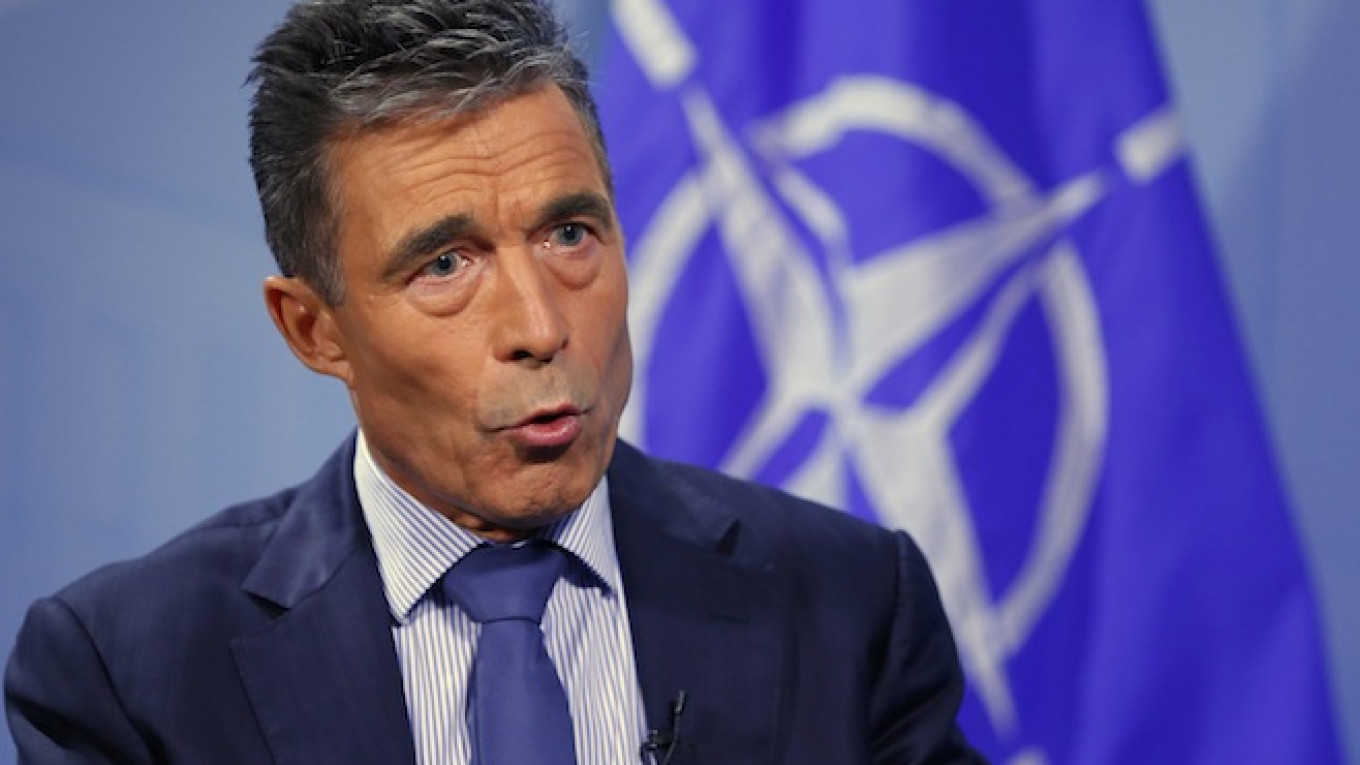NATO said Monday there was a "high probability" that Russia could launch an invasion of Ukraine under the guise of a humanitarian mission.
Kiev said it was in the "final stages" of recapturing Donetsk, by far the biggest city under the control of the rebels. The battle for the city could be a decisive turning point in a conflict which has been ongoing ever since pro-Kremlin President Viktor Yanukovych was ousted in February following mass protests.
An industrial metropolis with a pre-war population of nearly 1 million, the main rebel-held redoubt rocked to the crash of shells and gunfire over the weekend and heavy guns boomed through the night into Monday from the outskirts of the city.
Ukraine appears to be pressing ahead with its offensive, undeterred by the presence of what NATO says are some 20,000 Russian troops massed on the nearby border for a potential ground invasion.
Kiev has said in recent days that it succeeded in using diplomacy to prevent Russia from launching a ground invasion to protect the rebels under the guise of a humanitarian mission. Moscow announced on Friday it was ending war games in the area.
But NATO Secretary-General Anders Fogh Rasmussen said there was still no sign Russia had withdrawn the troops it had massed at the frontier, which prompted warnings from the West last week that President Vladimir Putin could be planning to invade.
Asked in an interview how high he rated the chances of Russian military intervention, Rasmussen said: "There is a high probability."
"We see the Russians developing the narrative and the pretext for such an operation under the guise of a humanitarian operation and we see a military buildup that could be used to conduct such illegal military operations in Ukraine," he said.
NATO believes any Russian humanitarian mission would be used as a pretext to save the rebels, who are fighting for control of two provinces under the banner of "New Russia", a term Putin has used for southern and eastern Ukraine where Russian is spoken.
Despite the presence of the Russian troops at the frontier, Kiev has pressed on with its advance, apparently calculating that Western pressure can deter Putin from invading.
On Monday, the Kremlin ruled out a unilateral humanitarian operation. Putin's spokesman, Dmitry Peskov, said Moscow would only send humanitarian aid as part of an agreed international mission, words that could be read as an attempt to reassure the West and Kiev that Moscow is not planning an assault.
Cities 'Cut Off'
Ukrainian military spokesman Andriy Lysenko said government forces had finally succeeded in cutting off the road between Donetsk and Luhansk, the other main rebel-held city, which is closer to the Russian border. Kiev and its Western allies say the route has been the principal means of supplying the rebels in Donetsk with weapons.
"The forces of the anti-terrorist operation are preparing for the final stage of liberating Donetsk," Lysenko said. "Our forces have completely cut Donetsk off from Luhansk. We are working to liberate both cities but it's better to liberate Donetsk first — it is more important."
The leader of the rebels in Donetsk, Alexander Zakharchenko, a local man who took over the leadership from a Russian citizen last week, said the fighters were considering mounting a counter attack against government forces in the next 2-3 days.
Lysenko said clashes took place in several parts of eastern Ukraine over the past 24 hours with six Ukrainian service members killed and big losses to the rebel side. Rebel losses could not be independently confirmed.
Municipal authorities in Donetsk said artillery shelling knocked out power stations in the city and hit a high-security prison, killing one inmate and allowing more than a 100 criminals to escape.
"Tightening the Ring"
The past week saw increasingly urgent warnings from Kiev and Western countries that Putin appeared to be planning an invasion.
Western countries said Putin could invade to head off a humiliating rebel defeat.
But there have been signs in recent days that Moscow may be searching for another way to get out of the conflict, without being drawn into a ground invasion.
When the Russian citizen leading the rebellion in Donetsk abruptly stepped down in favor of local man Zakharchenko last week, many read that as a sign of potential deescalation: Kiev has said it could contemplate negotiations with locals but would never talk to foreigners it calls international terrorists.
See also:
Mass Prison Break in Donetsk After Rocket Attack Leaves Hundreds Free
A Message from The Moscow Times:
Dear readers,
We are facing unprecedented challenges. Russia's Prosecutor General's Office has designated The Moscow Times as an "undesirable" organization, criminalizing our work and putting our staff at risk of prosecution. This follows our earlier unjust labeling as a "foreign agent."
These actions are direct attempts to silence independent journalism in Russia. The authorities claim our work "discredits the decisions of the Russian leadership." We see things differently: we strive to provide accurate, unbiased reporting on Russia.
We, the journalists of The Moscow Times, refuse to be silenced. But to continue our work, we need your help.
Your support, no matter how small, makes a world of difference. If you can, please support us monthly starting from just $2. It's quick to set up, and every contribution makes a significant impact.
By supporting The Moscow Times, you're defending open, independent journalism in the face of repression. Thank you for standing with us.
Remind me later.






